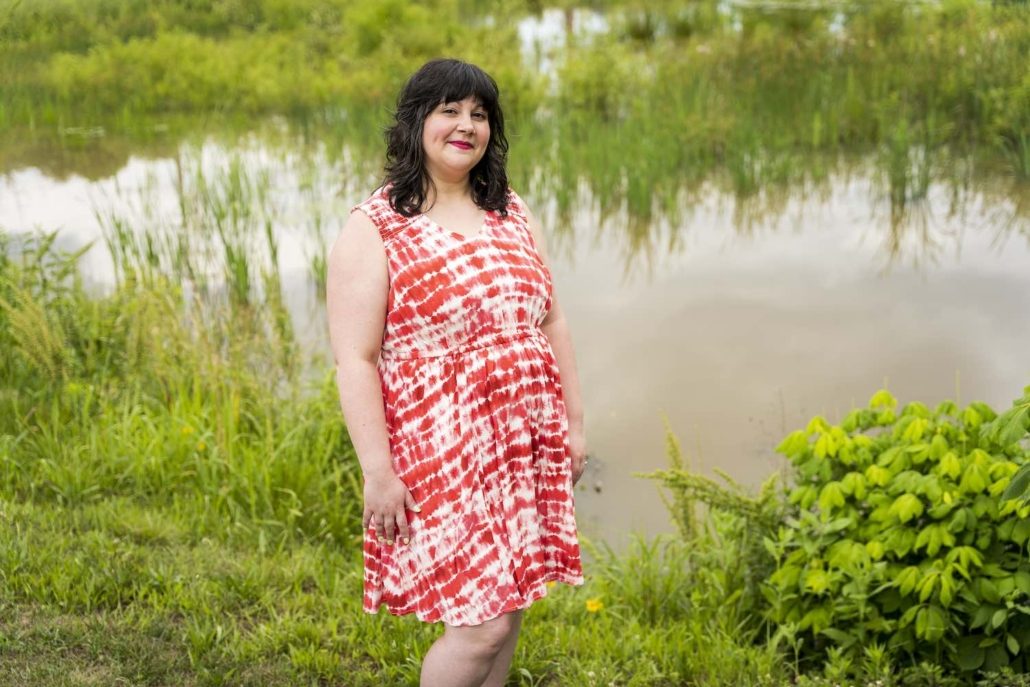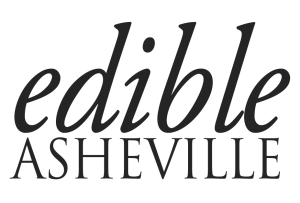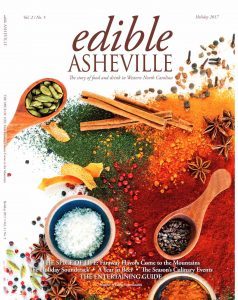DUMP YOUR DIET
Intuitive eating rejects diet culture to help rediscover the joy of food
BY GINA SMITH | PHOTOS BY ERIN ADAMS
***
Jumping on the latest trendy diet train in hopes of achieving a slimmer, more culturally acceptable physique is as American as sugar-free, low-fat, low-carb apple pie. A 2018 survey by Ipsos revealed that 83% of women and 74% of men feel dissatisfied with how their bodies look. That same year, the Centers for Disease Control and Prevention reported that nearly half of all adults in the U.S. had tried to lose weight within the past 12 months.
Unfortunately, statistics also show that weight loss through restrictive dieting often doesn’t work, at least not sustainably over time. Numerous studies over the past two decades indicate that many people who lose weight through a diet or exercise program tend to regain all of it back within a period of anywhere from two to five years.
“The two most common results of dieting are weight gain and eating disorders—not weight loss, not health improvements, not any of the stuff that we say we’re seeking,” says Naomi Katz, intuitive eating, body image, and self-trust coach and founder of Asheville-based Happy Shapes Coaching.
Given the challenges of conventional diets, an approach to food called intuitive eating has emerged. Intuitive eating rejects the idea that a healthy body has to be a thin body. Furthermore, it asserts that when we focus solely on losing weight, as opposed to feeding our body the food it needs, we develop an unnatural hang-up with food that tends to create bigger problems.
“Studies actually show that increased body dissatisfaction is one of the main results of dieting,” Katz continues. “You start getting compliments and feel really good when you initially start to lose weight. Then, when you stop losing weight and slowly start gaining it back, not only do you feel like a failure, but you stop getting compliments, peoplestop praising you; maybe they start looking at you like, ‘Oh, she put that weight back on!’ So that’s very powerful in terms of how we feel about ourselves and our bodies.”

A former pilates instructor and personal trainer whose life has been impacted by her own and family members’ eating disorders, Katz never felt comfortable with the fitness world’s emphasis on weight loss and body transformation. So when she discovered intuitive eating and its anti-diet focus, she felt an immediate alignment and began shifting the focus of her work.
“I’m not a nutritionist, a dietitian, or a therapist; what I am is a coach,” she points out. “I help people work through and reset their mindset as it relates to food and their bodies and how those things interact with body image and self-trust. I don’t make nutritional recommendations; it’s more mindset-based—how do we break out of diet culture?”
The Anti-Diet
Intuitive eating is a specific framework of 10 lifestyle principles developed in the 1990s by dietitian Evelyn Tribole and nutrition therapist Elyse Resch, explains Katz, who is a certified intuitive eating facilitator. “Intuitive eating is about rejecting the diet mentality and has aspects of joyous movement, honoring your hunger, and coping with emotions,” she says. “It’s a compassionate self-care eating framework that treats all bodies with dignity and respect and integrates instinct, emotion, and rational thought.”
In 2020, Tribole and Resch released the updated fourth edition of their 1995 book, Intuitive Eating: A Revolutionary Anti-Diet Approach, which explains the 10 principles and how to use them to develop a healthy body image. The principles (see page 49) include concepts such as rejecting the “diet mentality,” honoring your hunger, making peace with food, feeling your fullness, and engaging in joyful movement.
“They’re not steps, so they don’t necessarily have to go in order,” says Katz. “Some people don’t even do all of them, but they’re a framework you work through.” And more than 25 years since the book’s original release, the efficacy of this method is backed by significant evidence—over 125 scientific studies and papers validate that practicing intuitive eating can improve our overall health, relationship to food, and body image, she notes.
But intuitive eating is not a one-size-fits-all approach, Katz stresses, so people can jump into the framework with any principle that aligns most with their individual needs at the time. In her coaching practice, though, clients tend to start with No. 1: rejecting diet mentality. And that principle involves a lot of unpacking.
“We start with unpacking what your personal dieting history is—and that can be a really powerful place to start,” she says. There’s also the unpacking of cultural influences—the “thin ideal” and why we believe dieting is important. Part of this work includes reading and discussing Sabrina Strings’ book Fearing the Black Body: The Racial Origins of Fat Phobia, which argues that fat phobia and the thin ideal aren’t about health, but are instead a reflection of racism and anti-Blackness.
“We very much talk about this on a systems level,” she says. “In what way has diet culture operated as a system for oppressing and marginalizing people and things like that. That allows us to start realizing that not only does my lived experience align with the statistics that diets don’t work, but also, maybe this whole dieting thing doesn’t align with my values either.”
Respect Your Body
Katz makes it clear that the process of making peace with food and developing a positive body image is complex—there’s a lot more to it than just unzipping old beliefs. Learning to practice body respect is another key element. “The more you treat your body with respect, the more you start to feel respect for your body. And when I say practicing body respect, I’m talking literally about feeding yourself enough on a regular basis. Honoring your hunger is respecting your body; allowing yourself to feel pleasure when you eat is respecting your body.”
Also crucial to developing body respect is embracing body diversity and shifting internal narratives around food and eating. “Some bodies are supposed to be bigger than other bodies … It’s just nature,” says Katz. “Honoring your hunger is really just about meeting your needs and believing that your needs are valid. How often in other parts of our lives are we also denying our needs—in our relationships, in our jobs, in setting boundaries? When we start treating ourselves and our bodies with respect on a regular basis, it starts to make respecting ourselves and our bodies a practice.”
Learning to honor your health through “gentle nutrition” is last on the list of intuitive eating’s 10 principles and almost always falls near the end of the process in practice as well, says Katz. “The idea behind gentle nutrition comes from what we call ‘authentic health,’ where we bring together what we know from external sources, like scientific articles and advice from medical professionals, and our internal knowledge—what we experience in our body.”

Catherine Beck, a registered dietitian with Nutritious Thoughts in Asheville, describes gentle nutrition as tuning in to an awareness of what foods a person truly wants, what feels good in their body, and what gives them energy. “Oftentimes that can be a little bit scary,” says Beck, who discovered intuitive eating several years ago while doing an internship in eating disorder recovery.
“One might think, ‘If I’m tuning into my cravings, what if it turns out that the only food I want all the time ends up being cake, and all I want to eat is cake every day?” she says. “That’s where that awareness comes in: If we eat cake every day, how might that make us feel? Can we tune in to how we would feel physically and mentally if we did that? … Later down the line we might bring in a little nutrition education, looking at fiber and certain vitamins and minerals too.”
The Long Game
Getting in touch with lost internal cues around when we’re actually hungry and when we’re full, rather than heeding external diet rules is also key, says Beck. She offers the example of babies who naturally express hunger and eat according to their bodies’ needs. “But then we’re exposed to all these messages or external limitations and restrictions on our eating, whether that’s dieting rules about what we should and shouldn’t eat, or that we should eat at a specified time,” Beck explains. “Through all these variables, we lose the ability to get in touch with those cues.”
Like Katz, Beck says there is no black-and-white approach for implementing intuitive eating practices. Sometimes it begins with structured consistency around eating. Other times, there’s a focus on diving into practicing mindfulness and body awareness during meals.
“The important thing to consider when thinking about intuitive eating is that it’s the long game,” she says. “Getting back to honoring our internal cues takes some time. And we live in a world where dieting and food messaging is focused on short-term ‘success,’ right? Follow this for the short term and lose this amount of weight, or get on this meal plan and follow these dieting rules, and we’ll feel better really quickly. But intuitive eating takes some experimentation and time to get back to that awareness.”
While intuitive eating de-emphasizes weight, Beck points out that people shouldn’t feel ashamed for desiring to lose weight. “It’s not that [wanting weight loss is] bad; it’s that we don’t utilize that as a valuable metric,” she explains. “So we don’t weigh our clients unless there’s a true medical need, which is very rare. And we work to destigmatize and take away the power that weight can have over people.”
Beck, who practices intuitive eating in her own life, ac – knowledges that following the anti-diet path can feel tricky and alienating in a media-dominated culture saturated in diet messaging. When working with clients, she urges them to be curious about the messaging they’re exposed to daily. Sometimes she’ll do a social media audit to re – view and disconnect people from harmful body image and diet messages and connect with content that better serves them. And some people find that setting new boundaries within certain relationships or situations in their lives can help them disengage from unhelpful dieting messaging.
“It took me some time,” Beck says of her own intuitive eating journey. “I grew up as an athlete, and through that experience and different messaging I was exposed to, I had a misunderstanding and lack of connection between what my body needed versus what I was told I needed to per – form my best. …. It’s a continuing practice. I don’t know if anyone ever becomes a perfect intuitive eater, but it definitely feels better now.”
Katz says that practicing intuitive eating looks different depending on the day, the season of life, and other factors. “During a time when I am grounded and well-rested and not over-stressed and things are going really well, I’m eating foods that satisfy me, nourish me, give me energy and stamina, and make my body feel good,” she says. “I’m moving my body in a way that feels good to me on any given day—some days that might be more strenuous, sometimes that might be something more gentle. I’m set – ting boundaries, honoring my boundaries, I’m moving through the world in a way that honors my needs and my individual preferences.”
Conversely, on a day when she’s feeling overwhelmed or tired, it might mean giving herself the grace to have fast food for dinner or allowing herself not to work out that day. “It’s very rarely about the what and much more about the why,” says Katz. “It’s that we’re making choices that are rooted in autonomy, where we know why we’re doing it, and we’re offering ourselves compassion and kindness for the choices that we make.” ◊◊
A life-long lover of food and gardening, tailgate market junkie, and former food-service worker, Gina Smith has been a professional writer and editor for nearly two decades, hewing her writing focus nearly exclusively to food, beverage, and agriculture since 2013. In addition to her writing pursuits, she is the part-time coordinator for the Asheville Buncombe Food Policy Council.
Save
Save
Save
Save
Save
Save
Save
Save
Save
Save

Naomi Katz of Happy Shapes Coaching

Catherine Beck of Nutritious Thoughts
THE WEEKLY REVEL
Sign up for your free handpicked guide to enjoying life around Asheville.
Available weekly from May to October.





